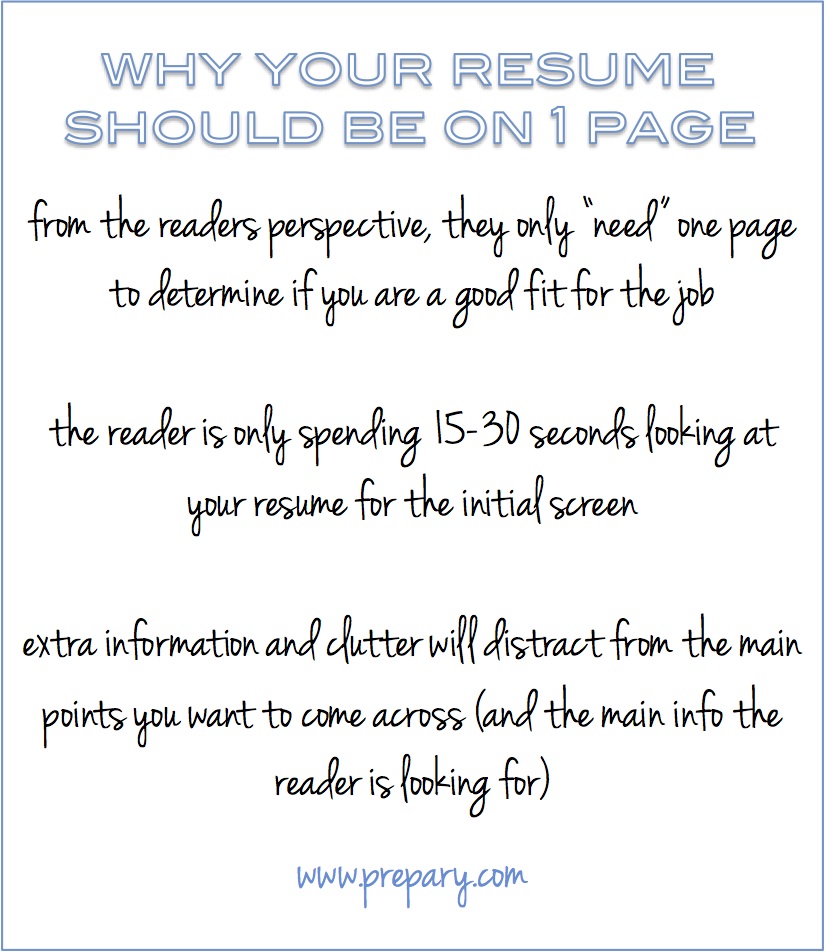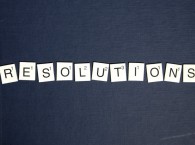One thing that I think we all hear all the time (and I tell clients all the time) is that your resume should be on one page. It’s one of those things that most career advisors pretty much agree upon (outside of some very special situations).
However, there is always a little push back: “How can I show off everything I’ve done on just one page?” or “But if I shorten it we’re going to lose X job/bullet.” or “I can’t tell my full story on just one page.” I’ve even wondered these things myself as it always seemed incredibly overwhelming to fit my professional life on one measly page.
But let me say this… your resume should be on one page. Here’s why:

1. From the readers perspective, they only need one page to determine if you are a good fit for the job.
The first mental adjustment I had to make is that my resume wasn’t about me. Well, of course it was technically, but the formatting was not for me – it was for the reader (the recruiter or the hiring manager). When you think about your resume from the “reader’s perspective” things start to make a little more sense. Ask yourself a few questions:
- Does the reader understand my “career story” when glancing at my resume quickly?
- If I delete this one thing, will the reader still think I am a good fit for the job?
- Is the resume really easy to follow if someone is only spending 15 seconds on it?
If the answers to those questions are “yes”, you are in good shape. When you think about how the person on the end it becomes easier to cut some things out. At the end of the day, your resume should be targeted for whoever is reading it and based on whatever job they are assessing you for.
2. The reader is only spending 15-30 seconds on your resume for the first screen
When recruiters and hiring managers are screening resumes, they take a pretty quick first glance. They are more concerned about the overall picture versus every bullet or detail. The things recruiters are really wondering are:
- what companies have you worked for?
- what was your role? (based on your title and any high level description you include of your role)
- how long have you done that role?
- what skills have you developed?
They don’t need to read your whole resume to get this information. It is your job to make sure these high-level details are very clear and easy to find (not crowded by lots of other info).
3. People get distracted by clutter, extra information, and extra pages!
Again, put yourself in the readers shoes. They are going through hundreds of these at once. If you were them, would you want to read onto a page 2? Probably not. Also, you want your main points to come through loud and clear. The more distracting information there is, the less likely that will be. If you absolutely must go onto a 2nd page, make sure your most relevant experience is on page 1.
All this being said, there are certain resumes that will be more than one page and it will be completely warranted (that’s fine). However, if you are in the first 10 years of your career and not in academia, one page really should suffice.
Another thing I’ll say is this: If I came across a candidate with perfect experience for the job I was hiring for and their resume was on 2 pages, this would NOT be a deal-breaker. Perfect experience trumps almost any rule!
The bottom line is one page resumes are easier to read, more likely to get your “story” across, and in general, will be easier to “digest” for your reader. So cut the filler, highlight your most important (and revenant) experiences and cut the excess! If you need help cutting it down, take a look at this post full of resume formatting tricks in Microsoft Word.





